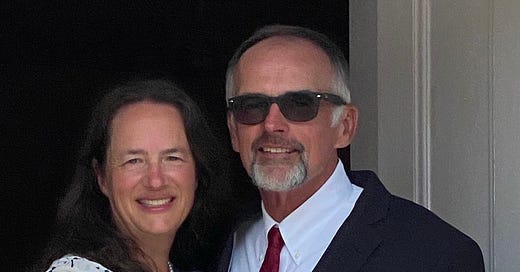
Late last night, the White House said in a statement that “President Biden and his team are closely monitoring the extraordinary events in Syria and staying in constant touch with regional partners.”
Early this morning, the Syrian government of Bashar al-Assad fell to armed opposition.
According to Jill Lawless of the Associated Press, the forces that toppled Assad are led by Hayat Tahrir al-Sham, or HTS, a coalition of Islamic groups formerly associated with al-Qaeda’s branch in Syria and currently designated a terrorist group by the U.S. and the United Nations, although its leaders have tried to distance themselves from al-Qaeda.
President Bashar al-Assad succeeded his father to the Syrian presidency in July 2000, establishing a totalitarian dictatorship. In 2011, Assad cracked down on protesters who were part of the Arab Spring, sparking a civil war of a number of factions fighting Assad’s troops, which by 2015 relied on support from Russia and Iran.
That war has turned half of Syria’s prewar population of 23 million (a little more than the population of Florida) into refugees and killed more than half a million people. With Russian and Iranian support, Assad managed to regain control of most of the country, with rebels pushed back to the north and northwest.
A stalemate that had lasted for years ended abruptly on November 27.
Iran and Hezbollah have been badly weakened by the ongoing fight of Israel against Iran-backed Hamas, Hezbollah, and the Houthis. On November 27, Israel and Lebanon signed a ceasefire agreement that made it clear that Hezbollah had been tied down in Lebanon and that its ability to fight had been severely compromised. At the same time, Russia has been badly weakened by almost three years of war against Ukraine, and the Russian ruble fell sharply again in late November after additional U.S. sanctions targeted Russia’s third-largest bank, creating more economic hardship in Russia and undercutting Putin’s insistence that he is winning against the West.
When opposition forces began an offensive on November 27, they took more than 15 villages in Aleppo province that day. Journalist Lawless recounted a quick history of the next 11 days, recording how the insurgents swept through the country with little resistance, taking Syria’s largest city, Aleppo, on the 29th. The Syrian military launched a counterattack on December 1, but the insurgents continued to gain ground, and by December 7 they had captured Syria’s third-largest city, Homs. They announced they were in the “final stage” of their offensive.
Today, December 8, Assad fled with his family to Moscow, where Russian president Vladimir Putin has offered him asylum. As Nick Paton Walsh of CNN put it, “Without the physical crutches of Russia’s air force and Iran’s proxy muscle Hezbollah, [Assad] toppled when finally pushed.”
In Damascus, crowds are praying and celebrating, and opposition forces have liberated the prisoners held in the notorious Saydnaya military prison. More than 100,000 detainees are unaccounted for, and their families are hoping to find them, or at least to find answers.
Meanwhile, after Assad’s regime fell, the U.S. Air Force struck more than 75 ISIS-related targets in Syria. “ISIS has been trying to reconstitute in this broad area known as the Badiya desert,” a White House senior official told reporters. “We have worked to make sure they cannot do that. So when they try to camp there, when they try to train… we take them out.”
National Security Advisor Jake Sullivan explained at the Reagan National Defense Forum in Simi Valley, California, that the U.S. will work to prevent the resurgence of ISIS. It will also make sure “that our friends in the region, Israel, Jordan, Iraq, others who border Syria, or who would potentially face spillover effects from Syria, are strong and secure.” Finally, he said, the U.S. wants to make sure “that this does not lead to a humanitarian catastrophe.”
Speaking to the nation this afternoon, President Joe Biden announced: "At long last, the Assad regime has fallen. This regime brutalized and tortured and killed literally hundreds of thousands of innocent Syrians." He called the fall of Assad’s regime a “fundamental act of justice” and “a moment of historic opportunity for the long-suffering people of Syria to build a better future for their proud country.”
But it is also “a moment of risk and uncertainty,” the president said. He noted that the U.S. is “mindful” of the security of Americans in Syria, including freelance journalist Austin Tice, who was kidnapped in 2012 and imprisoned by Assad’s regime. “[W]e believe he is alive,” Biden told reporters. “We think we can get him back, but we have no direct evidence of that yet.”
Biden noted that Syria’s main backers, Iran, Hezbollah, and Russia, could not defend “this abhorrent regime in Syria” because they “are far weaker today than when I took office.” He continued: “This is a direct result of the blows that Ukraine [and] Israel” have landed on them “with the unflagging support of the United States.”
In contrast to Biden’s comments, President-elect Donald Trump’s social media accounts took Russia’s side in the Syrian events. Noting that the insurgents looked as if they would throw Assad out, Trump’s account said that “Russia, because they are so tied up in Ukraine, and with the loss there of over 600,000 soldiers, seems incapable of stopping this literal march through Syria, a country they have protected for years.” The account blamed former president Barack Obama for the crisis of 2011 and said that Russia had stepped in then to stop the chaos. The Trump account suggested that Assad’s defeat might be “the best thing that can happen to” Russia, because “[t]here was never much of a benefit in Syria for Russia, other than to make Obama look really stupid.”
“In any event,” the account continued, “Syria is a mess, but is not our friend, & THE UNITED STATES SHOULD HAVE NOTHING TO DO WITH IT. THIS IS NOT OUR FIGHT. LET IT PLAY OUT. DO NOT GET INVOLVED!”
In contrast to Trump’s focus on Russia, journalist Anne Applebaum, a scholar of autocracy, took a much broader view of the meaning of Assad’s fall. In dictatorships, she wrote in The Atlantic, “cold, deliberate, well-planned cruelty” like Assad’s “is meant to inspire hopelessness. Ludicrous lies and cynical propaganda campaigns are meant to create apathy and nihilism.” Random arrests create destabilizing waves of refugees that leave those who remain in despair.
Authoritarian regimes seek “to rob people of any ability to plan for a different future, to convince people that their dictatorships are eternal. ‘Our leader forever’” she points out, was the slogan of the Assad dynasty. But soldiers and police officers have relatives who suffer under the regime, and their loyalty is not assured, as Assad has now learned.
The future of Syria is entirely unclear, Applebaum writes, but there is no doubt that “the end of the Assad regime creates something new, and not only in Syria. There is nothing worse than hopelessness, nothing more soul-destroying than pessimism, grief, and despair. The fall of a Russian- and Iranian-backed regime offers, suddenly, the possibility of change. The future might be different. And that possibility will inspire hope all around the world.”
—
Notes:
https://www.theguardian.com/world/2024/dec/02/who-are-syrian-rebels-hayat-tahrir-al-sham-hts-aleppo
https://www.newsweek.com/what-does-rubles-sharp-fall-mean-russias-economy-1992933
https://apnews.com/article/syria-assad-sweida-daraa-homs-hts-qatar-7f65823bbf0a7bd331109e8dff419430
https://www.cnn.com/2024/12/07/middleeast/analysis-damascus-syria-intl-latam
https://www.washingtonpost.com/world/2024/12/08/syria-prisons-sednaya-detainees-assad/
https://www.bbc.com/news/world-middle-east-39926914
https://www.defenseone.com/threats/2024/12/us-strikes-isis-syria-assad-regime-falls/401522/
https://apnews.com/article/syria-biden-austin-tice-bee5a5547a63e95eea5b75366d208f16
https://www.theatlantic.com/international/archive/2024/12/sudden-collapse-bashar-assad/680917/
https://www.csis.org/analysis/evolution-russian-and-iranian-cooperation-syria
https://www.idf.il/en/mini-sites/iran/the-history-of-iran-in-syria/
https://www.dni.gov/nctc/ftos/hts_fto.html
YouTube:
Bluesky:










I don't care if Trump was elected. He's a felon, a criminal with outstanding indictments. Trump is SO CLEARLY a Russian asset and a traitor to the United States. He is the biggest national security danger to our country. He must be stopped. Figure it out Merrick Garland, FBI, CIA - just find the final smoking gun to put this danger to world peace behind bars. Enough.
Trump has again shown his ignorance of foreign affairs by declaring that Russia didn’t benefit much from propping up Assad. The Russian military has now lost its only outposts on the Mediterranean, a major blow to various operations in the Middle East, Africa, and Eastern Europe - including Ukraine.
Not that we needed reminding of Trump’s glaring lack of intellect, which will cause so much harm abroad and at home.